Miles Morales Trumps Captain America, Killing The Avenger In A Politically Symbolic Gesture From Marvel
Amongst all of the fighting, a vision of the future appears, one that shows Captain America dead in Washington DC, killed at the hands of Miles Morales.
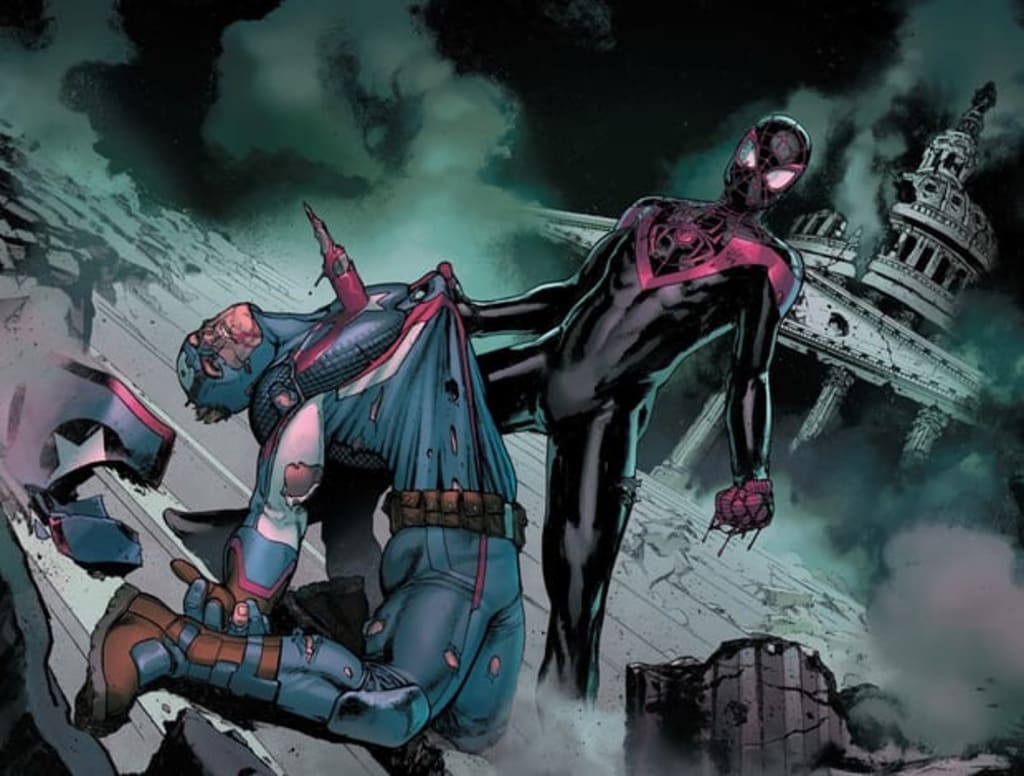
The dust has barely settled yet after "Civil War II" but we're already diving deep into the set-up for Marvel's next event - "Secret Empire". As readers of Civil War II: The Oath will know, there's one scene that links these two events in harrowing fashion. Amongst all of the fighting, a vision of the future appears, one that shows Captain America dead in Washington DC, killed at the hands of Miles Morales. We don't know how this will play out yet and whether Cap's death can even be averted, but the powerful symbolism of the scene is becoming clear...
What's Going On?
Let's take a closer look:
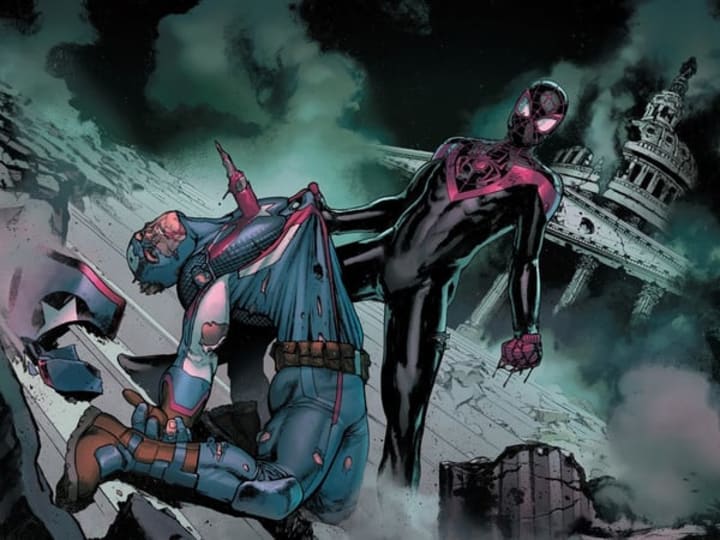
A vision from 'Civil War II'. [Credit: Marvel Comics]
This vision was one of the most pivotal moments in "Civil War II". Ulysses, an Inhuman with the power to experience the future, projected this vision into the minds of Marvel's assembled heroes - and, naturally, everybody freaked out.
The heroes came up with an unusual strategy to cope with this, encouraging Miles Morales and Captain America to confront one another in Washington DC. The strange logic seemed to be that, should the two meet in Washington and both survive, the vision would be averted. As Miles reflects in The Oath, though, who's to say that was when the vision was set? The two could potentially cross paths a hundred times in Washington before this final, brutal confrontation.
Check out this clip of a younger Miles Morales meeting Peter Parker for the first time:
What none of the heroes know, though, is that something is badly wrong with Captain America. Now ascended to the leadership of a reinvigorated S.H.I.E.L.D., Steve Rogers is secretly under the reality-warping influence of a living Cosmic Cube. His past has been rewritten, making him an agent of Hydra!
The Two Characters Are Symbols
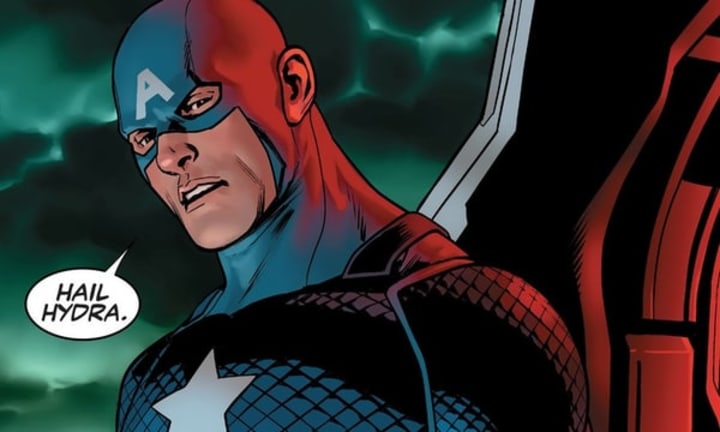
When the so-called 'Hydra Cap' arc was launched, I pointed out that Steve Rogers was being used as a symbol. Writer Nick Spencer used this opportunity to embody the quest for American self-identity, placing two Captain America's - Steve Rogers and Sam Wilson - on diametrically opposed sides. This was in the midst of one of the most divisive Presidential elections in US history, and it was pretty clear that Hydra Cap was being used as a critique of Donald Trump.
Again, as I've discussed elsewhere, Steve Rogers's developing status quo is symbolic; The Oath presents him as Marvel's Donald Trump, critiquing the world's heroes for building systems of increasing complexity and leaving the world's people behind. There are countless scenes in The Oath that build upon this symbolism, making Hydra Cap's ascendance a symbol of Trump's presidency.
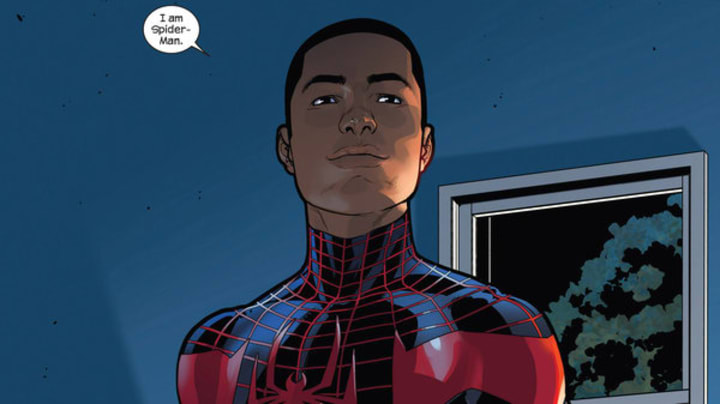
Another powerful symbol. [Credit: Marvel Comics]
Miles Morales, too, is symbolic. He was one of the first characters developed as part of Marvel's so-called 'Legacy Heroes', young teenage figures who stand for the diversity of modern America. His comics embrace multiculturalism on every level; his best friend, Ganke, is a Korean American. Significantly, Miles himself is now a refugee from another universe, one that was destroyed in Marvel's "Secret Wars" event. Miles is a symbol of integration, of diversity, and of acceptance.
Miles Morales Versus Captain America
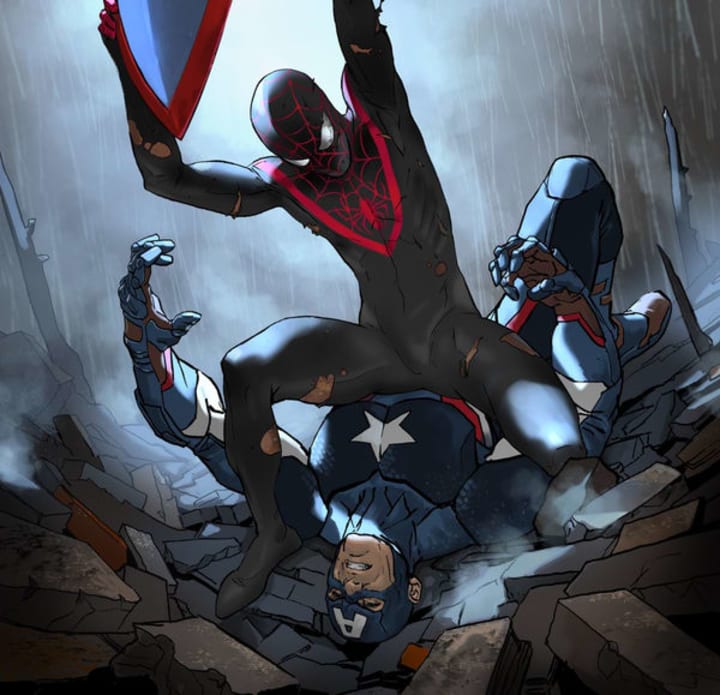
A cover from 'Civil War II'. [Credit: Marvel Comics]
By pitting these two symbols against one another, readers are given a head-on collision between two Americas. On the one hand, you have Captain America and Donald J. Trump, striving to destroy the complex world of the present day and build something they see as better, accusing the "elites" of abandoning the everyday Americans they're supposed to be all about. On the other, you have Miles Morales, a symbol of a younger generation who takes an opposing stance, embracing diversity in a way that would make Barack Obama proud.
This last election has seen the US divide along two lines; racial and generational. Washington DC, heavily influenced by black voters, delivered a 93% vote for Hillary Clinton. Trump won decisively in Florida, a state that is home to many white retirees. Taken nationally, millennials supported Hillary Clinton by 54% (although turnout was less than expected, given millennials had been engaged by Bernie Sanders during the primaries). So this last election clearly divides the US on both racial and generational lines. As yet, we have no hint of either side reaching out to the other to try to repair this divide.
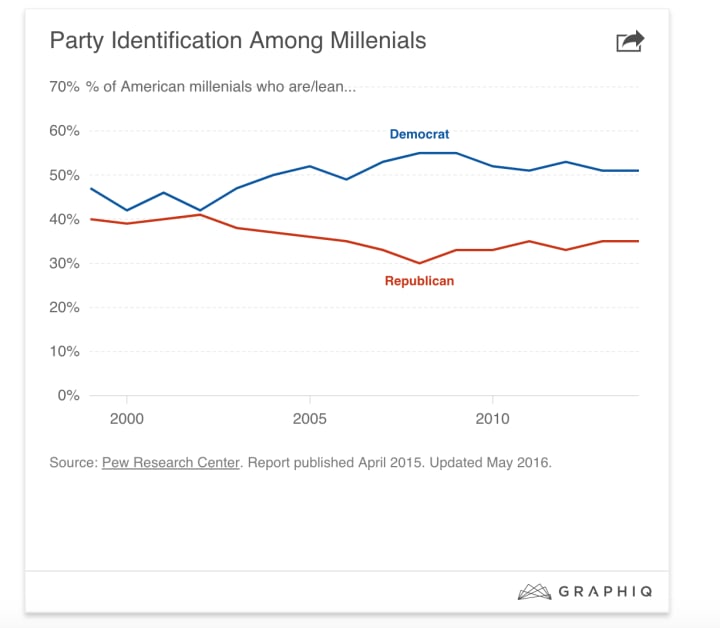
Source: Pew Research Center
When you factor this in, Ulysses's vision becomes a symbolic one. Within this potential future, the young, diverse America of Miles Morales is finally brought into head-on collision with the politics of Donald J. Trump - and Marvel's prediction of the outcome depicts a decisive victory for Miles Morales. This scene is a symbolic statement; Marvel believes that, whatever Trump may say, the future lies in diversity, as minority groups grow in number and millennials become more politically active. In Marvel's view, Donald Trump is a cast-back to a past that never existed, and he will ultimately be rejected by the future of America.
Comics have always been political, something which has been clearly evident ever since Steve Rogers first socked Hitler on the jaw, or even further back when Martin Luther used sequential images to call out the Pope during the Reformation. But this image - this vision of the future - is perhaps the most symbolic statement of all. Marvel is predicting that America's divides will not be healed, that two generations and two sub-culture will ultimately come into collision, and that the future belongs to the young, diverse world symbolized by Miles Morales. What's more, it suggests that Secret Empire is going to be a very powerful, political story indeed...
About the Creator
Tom Bacon
A prolific writer and film fan, Tom has a deep love of the superhero genre.



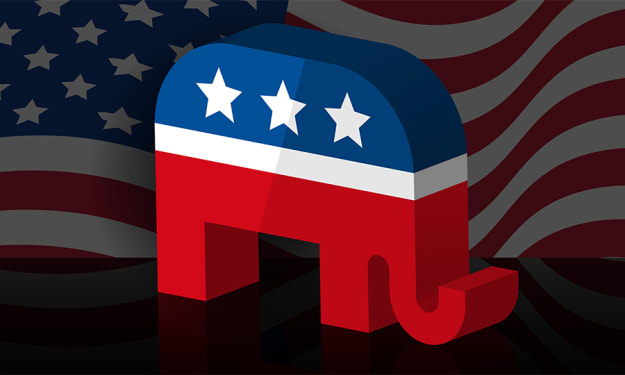


Comments
There are no comments for this story
Be the first to respond and start the conversation.